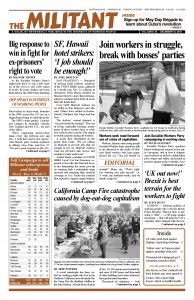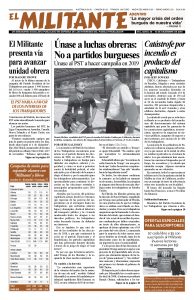December 13, 1993
CLIFTON, New Jersey — Waving signs calling for the defense of free speech, 250 striking dyers, finishers, and printers, members of the Amalgamated Clothing and Textile Workers Union, rallied in front of city hall here November 29 to protest criminal charges filed against seven workers for handing out strike literature.
More than 1,500 textile workers at 23 shops have been on strike since October 23. The owners insist on a higher copayment for reduced medical coverage, ending free access to the plant by union representatives, and a no-strike pledge during the life of the contract. The employers are also trying to implement a deeper two-tier wage system.
Striker Lester Rome, who has worked four years at Signature Clothing Co., one of the struck facilities, said, “Out here I may not be getting a paycheck, but at least I’m fighting.”
December 13, 1968
On Nov. 9, amid the rumble of crashing rocks, the clang of steel plate, and the roar of cement mixers, 78 miners were entombed in the Consolidated Coal Company’s Consol No. 9 mine near James Fork, W. Va.
Ever since the railroads made possible the opening of the great coal fields in Appalachia, mine disasters have struck with terrible frequency. It took the worst disaster in history — in 1907 — which killed approximately 362 men to bring the Bureau of Mines into existence. But the only power of investigation it had was with the consent of the mine owner!
In 1941 the Coal Safety Act was amended. While the bureau won the right to inspect mines, it had no power to enforce its findings.
Now has come the latest tragedy. Still the government has done nothing except to announce that still another “hearing” has been called.
December 11, 1943
The northern monopolists and the southern bourbons have joined hands to perpetuate a new crime against the American people. They have moved to deprive ten million men of the armed forces and the merchant marine of their right to vote.
Ten million men, forcibly removed from their families and their homes and transported to every section of the globe to face hardships, danger and death, all presumably on behalf of “democracy,” have thus themselves become one of the first casualties of democracy in the Second World War.
Congress is making a big mistake if it thinks it is dealing with just a lot of cannon fodder. Many of the soldiers are veterans of strike struggles. They may not be too concerned right now with voting for tweedle-dee or tweedle-dum in 1944, but they are very much concerned with their rights.

